Arab Americans feel 'a bone-deep sense of betrayal.' And they want Joe Biden defeated in 2024
DEARBORN, Mich. – Mohammad Enayah was asleep when his pinging cell phone alerted him to the message from Gaza.
It was 2 a.m.
“I hate to tell you this news,” his cousin wrote.
Thirty-seven members of his extended family had been killed in an Israeli air strike on a Palestinian refugee camp. Enayah read the first name on the list of victims, his father’s cousin. He scrolled further, then put the phone aside. He couldn’t read on. It would take a week before he would finally make it through the list of those who had died.
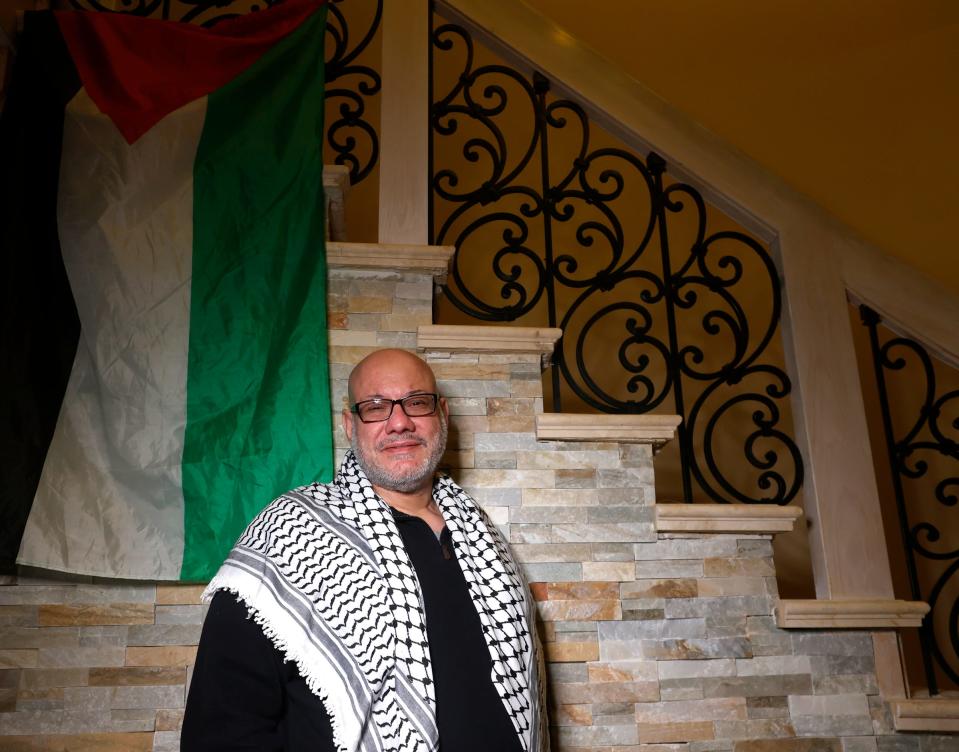
Enayah would eventually learn that 52 other members of his family in Gaza had been killed by the Israelis, 48 of them in a different strike on another refugee camp. Aunts and uncles, gone. Cousins, gone. Nephews and grandnephews, gone. In total, 89 members of his family, gone.
Three generations were wiped out, Enayah said, fighting back tears.
The staggering death toll – 28,000 Palestinians killed so far – and devastation Israel is inflicting on Gaza in its war with the Palestinian militant group Hamas are a source of deep personal pain and grief for Enayah and thousands of other Arab Americans in southeastern Michigan – and the reason so many of them are vowing to see that President Joe Biden is defeated in November.
Arab Americans have bristled at Biden’s unbridled support for Israel since the war began. From the moment that Hamas staged a surprise cross-border attack that killed 1,200 Israelis on Oct. 7 and touched off the latest conflict, Biden has overtly expressed solidarity with Israel and provided some of the weapons Israel has used in its offensive against Hamas.

Though he has described the Palestinian lives lost as a tragedy and last week condemned Israel’s response as “over the top,” he has further infuriated Arab Americans by resisting their demands that he call for an immediate cease-fire and by raising doubts about the Palestinian death toll.
Amer Zahr, a Palestinian American and attorney in Dearborn, found Biden’s “over the top” comment especially insulting.
“Five dead kids is over the top – maybe 20, maybe even 100,” he said. “But 12,000 kids is a genocide funded by the United States, led by him.”
Many of Michigan’s Arab Americans, some of whom still have family and friends living in the Gaza Strip and West Bank, are vowing not only to vote against Biden in the state’s Democratic primary on Feb. 27 and the general election in November – they are actively campaigning against him.
Michigan’s “Abandon Biden” movement, part of a larger national campaign, is hosting meetings with third-party candidates such as Jill Stein and Cornel West. A separate initiative, which organizers are calling “Listen to Michigan,” is urging Michigan Democrats to vote “uncommitted” in the primary to send a message to Biden that his actions in Israel are unacceptable.
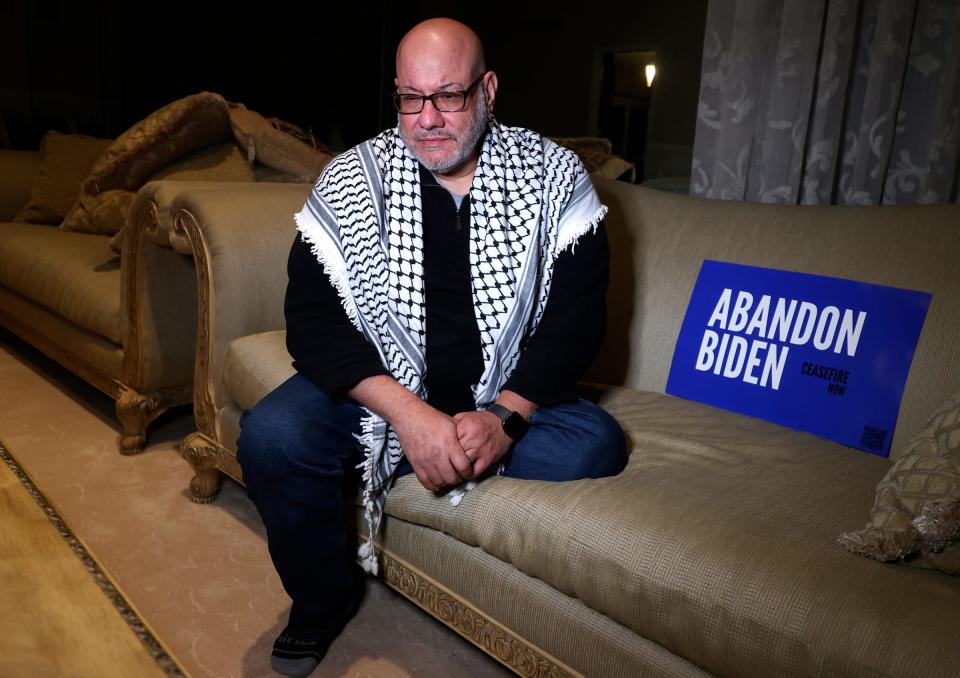
Arab Americans are a key voting bloc in Michigan, a swing state that Biden won by just 154,000 votes against Donald Trump in 2020. The White House and Biden’s campaign recognize the state's significance and are scrambling for ways to reassure the community in the face of an increasing backlash. The tension is so high that Arab American leaders even refused an opportunity to meet with Biden's campaign manager in January.
Biden “has lost the people,” said Abbas Alawieh, a Dearborn activist who is involved in the “Listen to Michigan” movement. “People feel not a vague sense of betrayal. People feel a deep sense of betrayal, a bone-deep sense of betrayal.”
A Biden campaign adviser said Biden’s team understands the hurt and anger felt by Arab Americans and expects the “uncommitted” movement to have a decent showing in the Feb. 27 primary. The campaign is working to be more responsive to Arab American concerns, the adviser said, but still feels optimistic about its chances in Michigan this fall because the state has a broad coalition of supporters, including union workers and Black voters, who will play a significant role in the election.
A war with no walls: Inside the devastating impact of Israel-Hamas war around the globe
An Arab American enclave in the shadow of downtown Detroit
Specialty stores and shops that cater to Dearborn’s Arab American community line a four-lane commercial strip that runs through the city.
All along Warren Avenue, there are halal meat markets and pastry shops, Middle Eastern bookstores and pharmacies, hookah bars and Shawarma restaurants. Signs outside most of the stores are written in Arabic.
At the New Yasmeen Bakery, women wearing traditional hijabs, or Muslim head coverings, shopped one day last week for delicacies such as stuffed grape leaves, chocolate cookies topped with crushed pistachios and rounds of fluffy, freshly baked pita.
On the other side of town, a bearded young man stood on a busy street corner outside a shopping center and waved a large green-, white- and black-striped Palestinian flag.
“Do you support Palestine?” he yelled at a passerby.
Michigan has roughly 310,000 residents with Middle Eastern or North African ancestry, according to 2020 census data. How many of those are registered voters is unclear. But Arab Americans can account for as much as 5% of the vote in Michigan, depending on turnout. Arab American advocates have been trying to push that percentage even higher by encouraging those who are eligible to register to vote.
The debate over whether the Arab American vote in Michigan can swing this year’s election has focused heavily on Wayne County cities like Dearborn. Just nine miles west of downtown Detroit, in the shadow of the city’s towering skyscrapers, Dearborn has the largest concentration of Arab Americans in the United States. Fifty-five percent of its residents are Middle Eastern or North African.
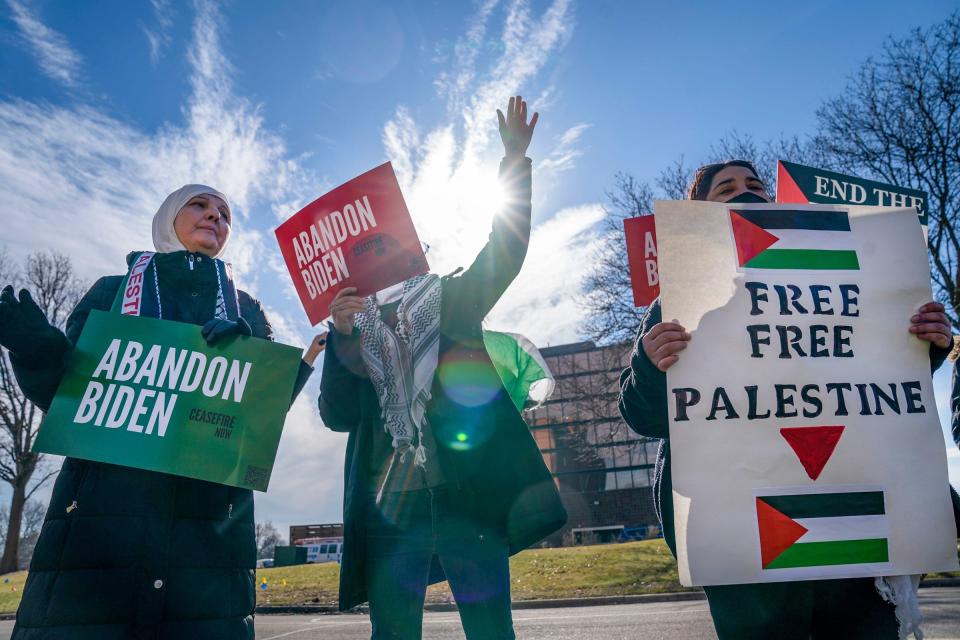
Arab Americans were well aware of Biden’s long history of supporting Israel, but they voted for him in 2020 over Trump, whose anti-Muslim rhetoric and orders imposing a travel ban from predominantly Muslim countries left many feeling like Biden was their only choice, said Hani Bawardi, an associate professor of history and Arab American studies at the University of Michigan-Dearborn.
“He was the lesser of two evils,” Bawardi said. But, “it was not an enthusiastic vote for Joe Biden.”
Whatever enthusiasm there was for Biden vanished amid his response to the war in Gaza. Rep. Rashida Tlaib, a Democrat who represents the area and is the first Palestinian American woman elected to Congress, has been an outspoken critic of the administration's response. Other Arab Americans who have been working for years to establish ties to the Democratic Party power structure are now questioning their commitment not only to Biden but to the party itself because of the gravity of the war in Gaza, Bawardi said.
“That will override any other concern at the moment,” he said, “and Biden seems to know that.”
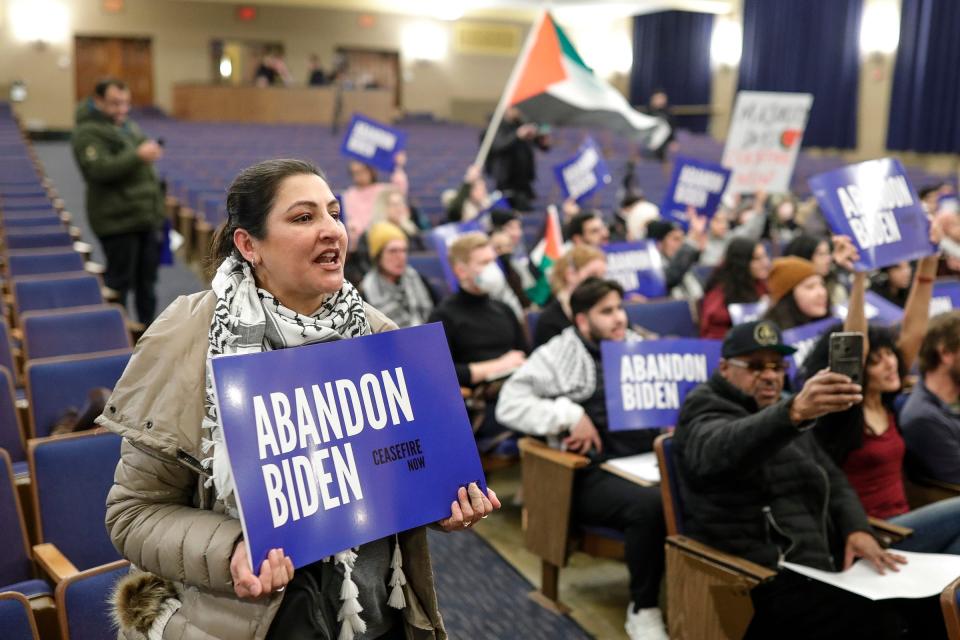
Last week, Biden dispatched a team of his senior advisers to Dearborn for a series of private meetings with politicians, community advocates and faith leaders for discussions about the war in Gaza. Biden’s campaign had offered to sit down with community leaders earlier, but Dearborn Mayor Abdullah Hammoud and others refused, saying Biden should be sending policymakers, not campaign officials. When the White House officials finally arrived, they were met with protesters chanting “cease-fire now” and “stop the genocide.”
Participants in those meetings said the Biden officials conceded there had been “mistakes and missteps” in the response to the war in Gaza and apologized for how the administration has talked publicly about Palestinians during the deadly conflict. But admitting mistakes and offering apologizes is not enough, said Alawieh, the Dearborn activist who attended one of the meetings.
“It’s time for him to take action, and he’s failing to do so,” Alawieh said. “And that’s going to have political consequences.”
Humanitarian crisis: Gaza's dwindling water, electricity supply could turn hospitals into 'morgues'
Refusing to vote for 'the lesser of two evils'
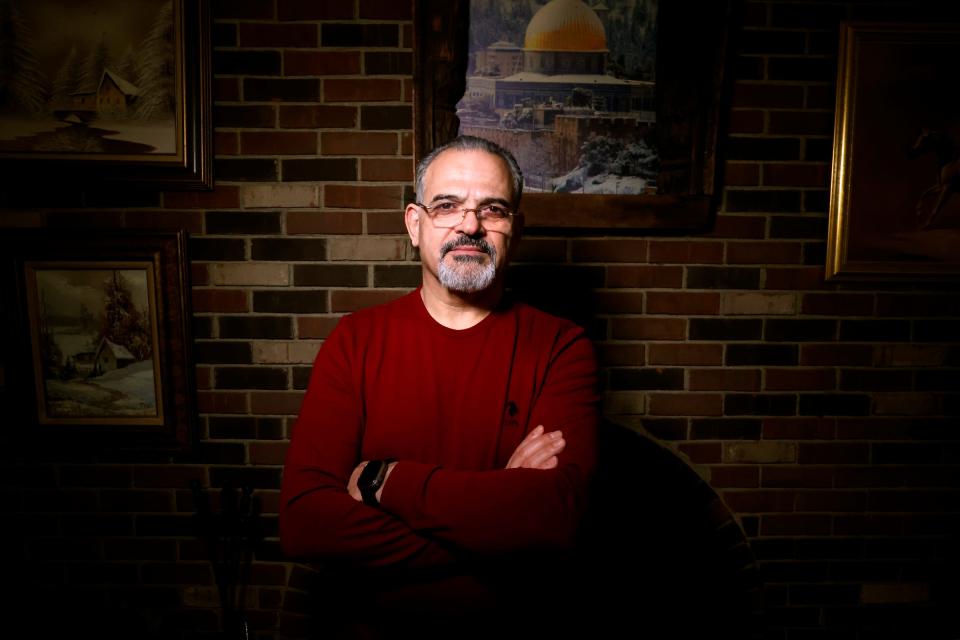
The key to Khalid Turaani’s old family homeplace in British-ruled Palestine rests atop a framed photo of his mom and dad.
Other family mementos, including the badge and number his father used as a young police officer, hang on the living-room wall of his home in West Bloomfield, about a half hour northwest of Detroit. Next to them is a 1946 British-archives map of the region of Palestine.
“Here is the village where my father was born, where my parents got married, where my oldest brother was born as well,” Turaani said, pointing out a speck on the map. “It is right on the shores of the Sea of Galilee.”
Turaani was born in a refugee camp in Syria and lived the first 16 years of his life there after his father was exiled at age 23. His parents took the key to the old homeplace with them when they were forced to leave. It’s a Palestinian tradition, he said, “a symbol of their will to return.”
Turaani came to the United States as a college student and eventually settled in Michigan. He backed Bernie Sanders for president in 2020 but supported Biden after Sanders dropped out of the race. Now, he’s working to make sure Biden doesn’t get a second term.
Turaani, a business consultant, is one of the founders of the “Abandon Biden” movement. A registered Democrat, he had a “Biden-Harris” sign on his front lawn four years ago. But “I put aside any kind of party affiliation when it comes to the wanton killing of people and genocide,” he said.
Is there anything Biden can do to persuade Turaani to vote for him in November?
“If he could unbreak the hearts of the 20,000 Palestinian women who lost their children or if he could bring back those lives that he actively supported their killing, then maybe Joe Biden could have redeemed himself 27,000 Palestinians ago,” he said. “To me, it’s like a serial killer who says if you just forgive me, I’ll stop killing, but if you don’t, I’ll keep killing. It’s like, no, you need to stop killing, period.”
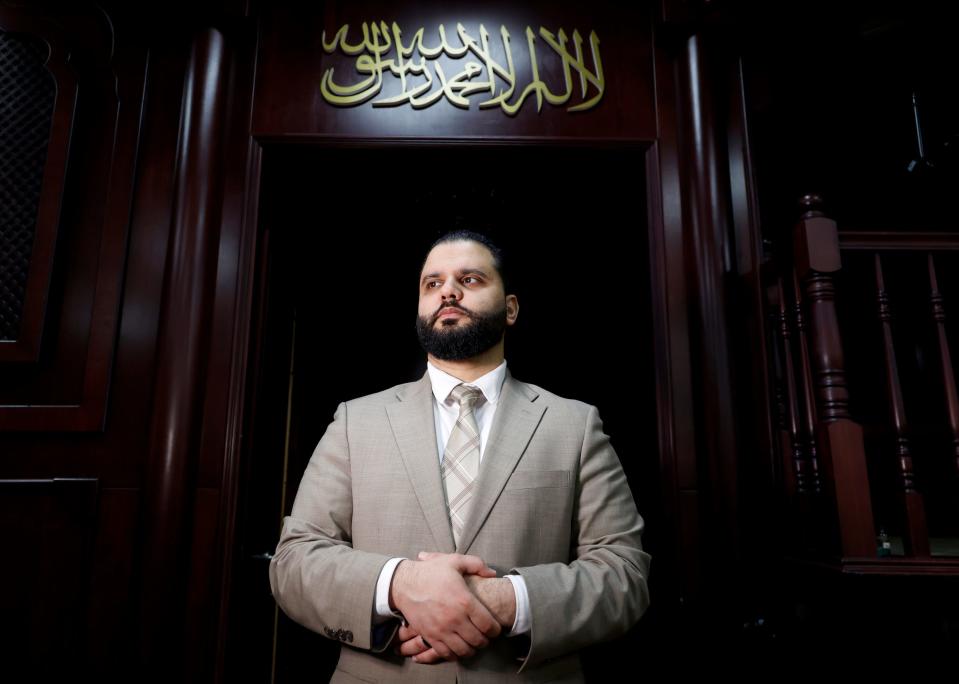
Imran Salha, who was born and raised in New Jersey but whose family hails from a village in the West Bank, said he voted for Biden in 2020 not “because I thought he was a beacon of morality. I voted for him because he wasn’t Trump.”
Given everything that has happened since, Salha said he can’t in good conscience vote for Biden again.
“If I were to sign that ballot with President Joe Biden’s name, the ink that I would use to sign that ballot would be through the blood of innocent Palestinians who were murdered in this recent onslaught,” Salha said just a few minutes after the 6 p.m. prayer service at the Islamic Center of Detroit, where he serves as the imam.
Salha, who stressed that he was speaking as a private citizen and not in his capacity with the Islamic Center, said he recognizes that his refusal to vote for Biden could put Trump back in the White House. But, he said, “there needs to be a red line where I could show the people in power that I will not allow you to take me for granted.”
Faten Saab, a stay-at-home mom who was one of the protesters outside the hotel where Biden’s advisers met with local leaders, said she still hasn’t decided who she will vote for in November, “but it won’t be Joe Biden.”
She might vote for a third-party candidate or sit out the election altogether, “but we’re not going to choose the lesser of two evils,” she said.
Her sister, Nadia Saab, a registered nurse from Dearborn, said she has lost faith in Republicans and Democrats. “It’s just quite insulting that we have a president who can aid and abet in the killing of 30,000 people and then still expect to get our vote,” she said.
Both sisters refuse to accept the argument that voting for someone other than Biden could hand the presidency to Trump. “It would be Joe Biden handing the presidency to Donald Trump,” Faten Saab said.
A push for peace: Biden says US is working on new hostage deal that would pause fighting in Gaza for 6 weeks
Voting for Trump and honoring the dead
Enayah wipes away the tears that fill his eyes when he remembers family members killed in Gaza. In the next room, the TV flashes with the latest headlines from the Middle East.
Television got Enayah and his wife through the first few months of the Trump administration. They were so devastated by Trump’s election in 2020 that they couldn’t bear to watch the news, so they would instead tune into the late-night shows and laugh as comedians poked fun at the new president.
“That’s how we survived,” he said.
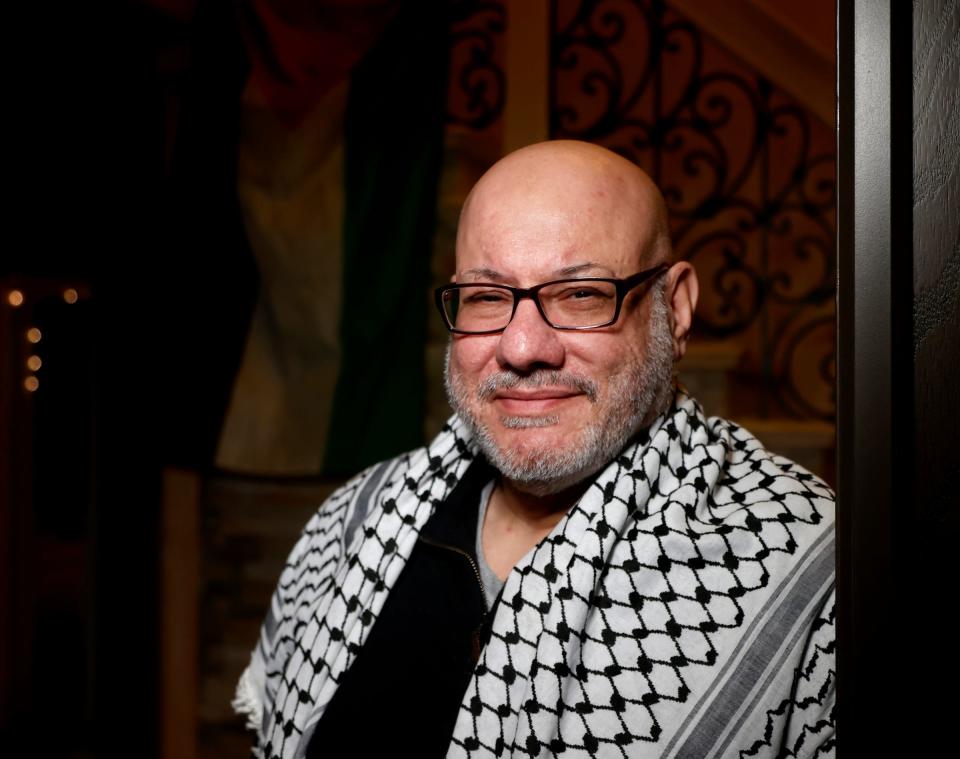
Now, he relies on the news to get him through the day. He turns the TV on first thing each morning and leaves it on until he goes to bed at night.
Enayah, an automotive design manager born in Kuwait to a Gaza refugee, considers himself a liberal and has supported progressive causes for years. These days, though, he keeps an “Abandon Biden” poster in his car so that whenever there’s another protest, he’s ready. He voted for Biden in the last presidential election. But if his choice is between Biden and Trump in November, he’s voting for Trump.
“Trump all the way,” he said, quickly adding, “I am going to be an advocate for Trump with everybody I know."
Enayah recognizes how that might sound to most people, given Trump’s anti-Muslim rhetoric and policies. But he feels like he has no choice.
Voting for Biden would be dishonoring all those who have died.
Contributing: Niraj Warikoo of the Detroit Free Press
Michael Collins covers the White House. Follow him on X, formerly Twitter, @mcollinsNEWS.
'Self-silencing': For Palestinians, talking about Hamas comes with hazards
This article originally appeared on USA TODAY: Biden's support for Israel may cost him Arab American vote in 2024
